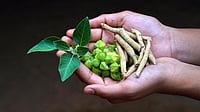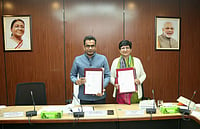In a major scientific breakthrough, researchers from Delhi Technological University (DTU) have identified powerful anti-cancer properties in a Himalayan tuber, Dioscorea deltoidea, offering fresh hope in the battle against breast cancer.
Led by Dr. Anuradha and Dr. Navneeta Bharadvaja from the University’s Plant Biotechnology Laboratory, the study combines modern computational biology with traditional plant medicine.
Using advanced bioinformatics tools, the researchers found that compounds from this wild yam plant could target and disrupt critical pathways linked to breast cancer growth and spread.
Often used as a staple food in hilly regions, Dioscorea deltoidea is now being recognised for much more than its nutritional value.
“We discovered that several compounds in the plant — especially diosgenin, dioscin, and deltonin — can bind to cancer-related proteins and potentially prevent tumor progression,” said Dr. Bharadvaja in a study titled ‘Unravelling the therapeutic potential of Dioscorea deltoidea against breast cancer: a combinational approach via network pharmacology and molecular docking’ published in the latest issue of journal ‘Current Science.’
The team used a technique called network pharmacology to map how the plant’s natural compounds interact with the human body at the molecular level. This was followed by molecular docking and simulation modelling, which simulate how these plant-based molecules fit into cancer-associated proteins, much like a key fits into a lock.
Their analysis revealed that eight key compounds from the tuber were able to influence 33 proteins involved in breast cancer. Among them, seven proteins — including PDGFRB, FGF2, and HSP90AA1 — were identified as major players in cancer development, particularly in aggressive types like triple-negative breast cancer (TNBC).
These findings are significant because they provide a scientific explanation for how traditional medicinal plants like Dioscorea deltoidea could be repurposed into modern cancer treatments.
“Our research opens a new window into how plant-based therapies can support or even enhance cancer treatment, especially in countries like India where herbal medicine has deep roots,” said Dr. Anuradha.
However, the researchers caution against mixing herbal remedies with chemotherapy without medical supervision. “Herb–drug interactions can interfere with treatment and should only be considered once clinically validated,” Dr. Bharadvaja emphasised.
While treatments exist, their side effects and limitations make plant-based alternatives an attractive area of research.
The study adds to growing evidence that natural compounds — when scientifically studied — can offer powerful health benefits.
As the scientific community looks for safer, more affordable, and effective therapies, Dioscorea deltoidea may soon move from humble kitchen gardens and forests into the frontline of breast cancer care, said the authors.
Breast cancer is the second most common cancer worldwide and a leading cause of cancer-related deaths among women in India, with rising cases projected to surpass 20 million annually by 2025. Globally also the situation is not very encouraging. According to the World Health Organisation's latest report, if current rates of diagnosis continue, then by 2050 there will be 3.2 million new breast cancer cases and 1.1 million breast cancer-related deaths every year.



























